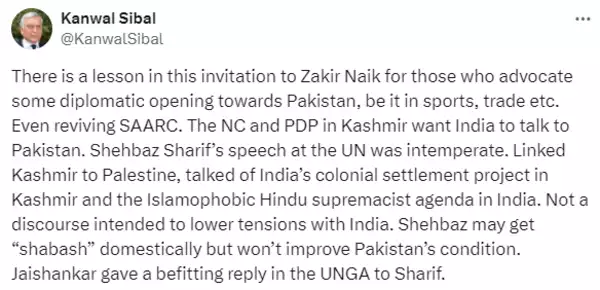
NEW DELHI: Zakir Naik, a controversial Islamic evangelist who is wanted in India on terror-linked charges, landed in Islamabad on October 1 with Pakistan Prime Minister Shehbaz Sharif welcoming the fugitive with wide arms and cosy hugs.
Pakistan’s move to roll out the red carpet for Naik, who is there for a month-long visit, reek of mischief by the Sharif dispensation with the objective of opening up a new front of confrontation with India, which has virtually suspended its bilateral relations with Islamabad since the 2017 Uri and 2019 Pulwama terror attacks.India had carried out surgical strikes and Balakot air strikes in response to these terror attacks.
The tension between India and Pakistan was palpable at the United Nations General Assembly (UNGA) meeting last week, when external affairs minister S Jaishankar tore into Islamabad and warned that its “cross-border terrorism policy can and will never succeed”.
In a strong-worded reply to Pakistani PM Shehbaz Sharif‘s UNGA speech where he accused New Delhi of “escalating tensions” in Kashmir, Jaishankar warned that Islamabad’s “actions will most certainly have consequences”.
Naik’s Pakistan visit to fuel tension?
In the backdrop of such strained relations, Pakistan’s invitation to Zakir Naik has raised eyebrows, with some experts of the view that the fugitive’s visit is likely planned to fuel tension between the two nations.
“As a purveyor of hate speech, Zakir Naik has been banned from several countries including India. In giving him a royal reception, Pakistan is announcing that it is committed to embracing fundamentalism and is willing to set aside global opinion,” social activist Pervez Hoodbhoy told Deutsche Welle.
Amit Ranjan, a research fellow at the Institute of South Asian Studies, National University of Singapore, said: “As Pakistan is already facing violence related to social and political problems, giving space to Naik is nothing but an addition to the existing tensions.”
In Naik’s Pakistan visit, the only silver lining perhaps is that it provides New Delhi with a fresh opportunity to justify its claims that the neighbouring country continues to welcome and facilitate “anti-India” elements.
“There is a lesson in this invitation to Zakir Naik for those who advocate some diplomatic opening towards Pakistan, be it in sports, trade etc. Even reviving SAARC. The NC and PDP in Kashmir want India to talk to Pakistan. Shehbaz Sharif’s speech at the UN was intemperate. Linked Kashmir to Palestine, talked of India’s colonial settlement project in Kashmir and the Islamophobic Hindu supremacist agenda in India. Not a discourse intended to lower tensions with India. Shehbaz may get “shabash” domestically but won’t improve Pakistan’s condition. Jaishankar gave a befitting reply in the UNGA to Sharif,” Kanwal Sibal, former Indian foreign secretary, wrote on X.

The controversial “televangelist” has been living in Malaysia since India’s anti-terror agency launched an investigation against him in 2016.
Naik has been accused of promoting radical views similar to those of groups like the Islamic State and the Taliban, leading to bans on his speeches in India, Bangladesh, Canada and the United Kingdom.
Naik has delivered over 1,500 public lectures since 1994, often asserting that Islam is the only true religion and criticising other faiths, as well as non-Wahhabi Islamic sects such as Shias, Sufis, and Barelvis.
Why NIA and ED are after him
Naik is the founder of Peace TV, a channel on comparative religion with a reported audience of over 100 million. It faces a ban in India in connection with alleged money laundering and hate speeches.
India also banned IRF in 2016, accusing it of encouraging followers to promote enmity and hatred. He fled India in July 2016 after Bangladeshi authorities claimed that one of the attackers on a cafe in Dhaka was inspired by Zakir Naik. The incident had left 22 people dead.
The NIA filed a charge sheet under Section 10 of Unlawful Activities (Prevention) Act and various sections of the Indian Penal Code, which has been replaced by Bharatiya Nyaya Sanhita. The investigation revealed that Naik is the founding trustee and a member of an “unlawful association” – IRF.





